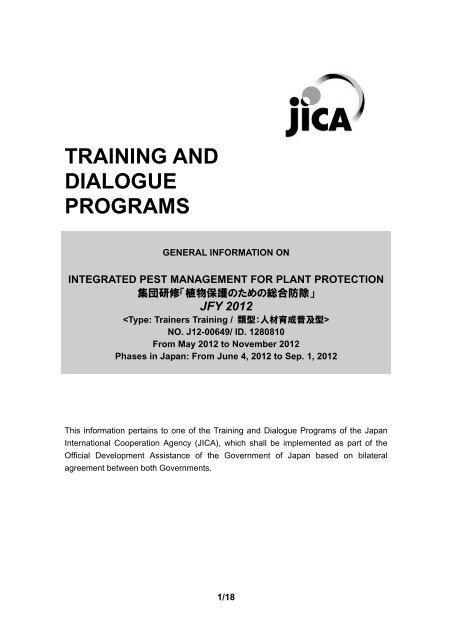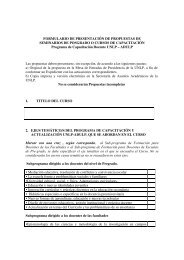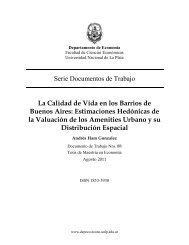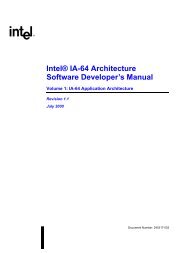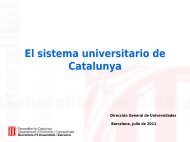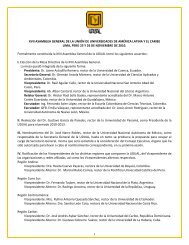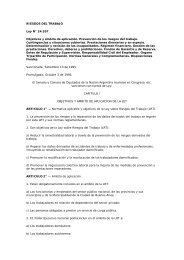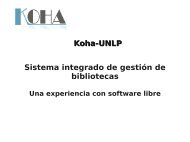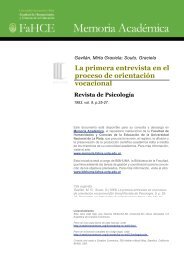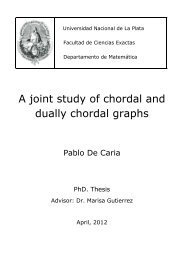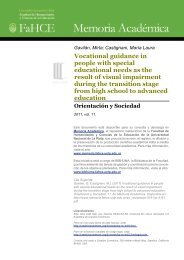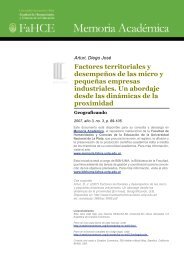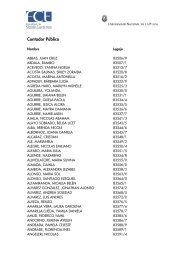TRAINING AND DIALOGUE PROGRAMS
TRAINING AND DIALOGUE PROGRAMS
TRAINING AND DIALOGUE PROGRAMS
You also want an ePaper? Increase the reach of your titles
YUMPU automatically turns print PDFs into web optimized ePapers that Google loves.
<strong>TRAINING</strong> <strong>AND</strong><strong>DIALOGUE</strong><strong>PROGRAMS</strong>GENERAL INFORMATION ONINTEGRATED PEST MANAGEMENT FOR PLANT PROTECTION集 団 研 修 「 植 物 保 護 のための 総 合 防 除 」JFY 2012NO. J12-00649/ ID. 1280810From May 2012 to November 2012Phases in Japan: From June 4, 2012 to Sep. 1, 2012This information pertains to one of the Training and Dialogue Programs of the JapanInternational Cooperation Agency (JICA), which shall be implemented as part of theOfficial Development Assistance of the Government of Japan based on bilateralagreement between both Governments.1/18
6) Climatic riskmanagement,Access to database7) IPM plan suited foreach country(1) Vulnerable environment and needs forIPM for sustainable society & environment(2) Conservation of biosphere andbio-diversity: a role of agro-ecosystem(3) Risk management of climatic change’seffect on IPM(4) Access to information or database for IPMDraft IPM plan (action plan) formulation andpresentationLectureDiscussionObservationField tripLab WorksDiscussion(3)Finalization Phase in a participant’s home countryParticipating organizations produce final outputs by making use of results brought back byparticipants. This phase marks the end of the Program.ModulesA draft IPM plan(action plan) will beconsidered for itsimplementation withthe participatingorganizationActivitiesParticipants will report the plan and consider itsimplementation with their organizations and submit ProgressReport including a revised plan by the end of November,2012.5/18
3. Final Phase (activities in home country)Participants are expected to implement the IPM plan (action plan) with theirorganizations and submit Progress Report within three (3) months after the end of thecore phase in Japan.10. Follow-up Cooperation by JICA:JICA might provide follow-up support to participating organizations that want toimplement the IPM plan (action plan). Please note that the support shall be providedselectively based on proposals from the participating organizations.7/18
“KENSHU-IN GUIDE BOOK,” which will be given to the selected participantsbefore (or at the time of) the pre-departure orientation.6. Pre-departure Orientation:A pre-departure orientation will be held at the respective country’s JICA office (orJapanese Embassy), to provide participants with details on travel to Japan,conditions of the workshop, and other matters.V. Other Information1. Participants who have successfully completed the program will be awarded acertificate by JICA.2. For the promotion of mutual friendship, JICA encourages international exchangebetween JICA participants and local communities, including school and universitystudents as a part of development education program. JICA participants are expectedto contribute by attending such activities and will possibly be asked to makepresentations on the society, economy and culture of their home country.3. Each guest room also has the access by LAN cable. It is advisable to bring lap topcomputer in order to avoid congestions. There is a computer room in JICA Kansaiwhere sixteen desk-top computers have the internet access.12/18
VI. ANNEX:Information on Individual studiesThe following programs are arranged such that prepares the participant to receiveintensive research training in given laboratory of Kobe University. Each laboratory offersseveral research subjects to the participant. The applicant has to choose some of theresearch subjects and carry out experiments in one of the subjects chosen byhimself/herself. Through the experimental work, the participants will be able to acquiretechniques and ideas under the guidance of the staffs of the University.In case you need to bring something such as plants or seeds into Japan for yourexperiments, please follow the necessary procedures ahead of time in your country,such as procurement and agriculture censorship.A. Laboratory of Plant Pathologya. Diagnosis (material: Magnaporthe spp.)Isolation and maintenance of isolates, Determination of cultivar-specificpathogenicity using a traditional technique (i.e., inoculation of differentialcultivars), Determination of species-specific pathogenicity using a moleculartechnique, PCRb. Biological control (material: Ralstonia solanacearum)B. Laboratory of Entomologya. Ecological studies of pest insects and their natural enemiesEstimation, monitoring and comparison of insect and spider populations, andrearing of parasitic wasps as control agents of insect pests.b. Mass culture techniques of pest species in the laboratory and life cycle analysesunder controlled environmental conditions.Laboratory rearing techniques of pest species include cockroach, crickets,grasshoppers, flour moths, wax moths, noctuid moths, sawfly, Ichneumonidwasps, Tricogramma wasps, two spotted spider mites, bean bugs etc.c. Toxicological and pharmacological analyses of certain insecticides and miticidesToxicological tests should be conducted for IGRs, BT, and organic pesticides.The Magnus assay will be conducted for the receptor binding. Effects of agonistsand antagonists should be learned.d. Preliminary molecular techniques will be learned for improving beneficial insects,such as PCR techniques, sequence analysis, transposon-DNA injection etc.e. Pathological effect of Bacillus thuringensis will be investigated by histologicaltechniques.f. For post-harvest pest management, the effect of various temperature treatmentswill be studied including supercooling point and mortality.C. Laboratory of Agrochemical Sciencea. Pesticide residues and environmental hazardous chemicals by enzyme-linkedimmunosorbent (ELISA) assay.D. Laboratory of Functional Phytochemistry(Weed Science A)a. Studies on the host plant – parasitic plant interactionsPurification and characterization of germination stimulants for root parasitic weed13/18
seeds. Physiological and biochemical studies on germination stimulationmechanismsF. Laboratory of Tropical Botany (Weed Science B)a. Study on the herbicide resistant weedsControl measure for paddy weeds which sulfonylurea resistant biotypes such asMonochoria vaginaris, Scirpus juncoides, Lindernia spp. Pot experiment and labexperiment.* The applicant is requested to choose the subject among the above to be trained inthe order of his/her interest and fill in the Questionnaire.(Example) 1st choice Da2nd choice Ca3rd choice Ab14/18
* This questionnaire should be submitted together with Application Form.QUESTIONNAIREFOR APPLICANT OF THE GROUP <strong>TRAINING</strong> COURSEONINTEGRATED PEST MANAGEMENT FOR PLANT PROTECTION1. Indicate the choice of your research subject in individual studies shown in theprevious pages.1st choice ( )2nd choice ( )3rd choice ( )2. Have you studied the following subjects? (Please tick either Yes or No.)YesNoAgronomy ( ) ( )Plant Pathology ( ) ( )Applied Entomology ( ) ( )and ZoologyWeed Science ( ) ( )Pesticide Science ( ) ( )Biochemistry and ( ) ( )Molecular BiologyStatistics ( ) ( )3. Indicate your special interests in particular aspect or research techniques below:15/18
* JOB REPORT must submit with the application form.JOB REPORT should be prepared in accordance with the format below.Presentation of the report for about 20 minutes per each participant will be carried outprior to entering program.JOB REPORTTHE GROUP <strong>TRAINING</strong> COURSEONINTEGRATED PEST MANAGEMENT FOR PLANT PROTECTION(1) Name of Participant(2) Name of Organization(3) Organizational Chart(4) Description of your work(5) Climatic conditions and growing seasons on main crops in your country(6) Occurrence of diseases, pest insects and weeds on main crops in your country(7) Plant-protection-related problems you face in your work(8) Situation of extension service to the farmer’s level and relevant problems in the field ofplant protection(9) Your expectation to learn from this training program(10) Your expectation to utilize the result of this training program16/18
For Your ReferenceJICA and Capacity DevelopmentThe key concept underpinning JICA operations since its establishment in 1974 has been theconviction that “capacity development” is central to the socioeconomic development of any country,regardless of the specific operational scheme one may be undertaking, i.e. expert assignments,development projects, development study projects, training programs, JOCV programs, etc.Within this wide range of programs, Training Programs have long occupied an importantplace in JICA operations. Conducted in Japan, they provide partner countries with opportunities toacquire practical knowledge accumulated in Japanese society. Participants dispatched by partnercountries might find useful knowledge and re-create their own knowledge for enhancement of theirown capacity or that of the organization and society to which they belong.About 460 pre-organized programs cover a wide range of professional fields, ranging fromeducation, health, infrastructure, energy, trade and finance, to agriculture, rural development, gendermainstreaming, and environmental protection. A variety of programs and are being customized toaddress the specific needs of different target organizations, such as policy-making organizations,service provision organizations, as well as research and academic institutions. Some programs areorganized to target a certain group of countries with similar developmental challenges.Japanese Development ExperienceJapan was the first non-Western country to successfully modernize its society andindustrialize its economy. At the core of this process, which started more than 140 years ago, wasthe “adopt and adapt” concept by which a wide range of appropriate skills and knowledge havebeen imported from developed countries; these skills and knowledge have been adapted and/orimproved using local skills, knowledge and initiatives. They finally became internalized in Japanesesociety to suit its local needs and conditions.From engineering technology to production management methods, most of the know-howthat has enabled Japan to become what it is today has emanated from this “adoption and adaptation”process, which, of course, has been accompanied by countless failures and errors behind the successstories. We presume that such experiences, both successful and unsuccessful, will be useful to ourpartners who are trying to address the challenges currently faced by developing countries.However, it is rather challenging to share with our partners this whole body of Japan’sdevelopmental experience. This difficulty has to do, in part, with the challenge of explaining a bodyof “tacit knowledge,” a type of knowledge that cannot fully be expressed in words or numbers.Adding to this difficulty are the social and cultural systems of Japan that vastly differ from those ofother Western industrialized countries, and hence still remain unfamiliar to many partner countries.Simply stated, coming to Japan might be one way of overcoming such a cultural gap.JICA, therefore, would like to invite as many leaders of partner countries as possible tocome and visit us, to mingle with the Japanese people, and witness the advantages as well as thedisadvantages of Japanese systems, so that integration of their findings might help them reach theirdevelopmental objectives.17/18
CORRESPONDENCEFor enquiries and further information, please contact the JICA office or the Embassy ofJapan. Further, address correspondence to:JICA Kansai International Center (JICA KANSAI)Address: 1-5-2, Wakinohama-kaigandori, Chuo-ku, Kobe, Hyogo 651-0073, JapanTEL: +81-78-261-0341 FAX: +81-78-261-034218/18


